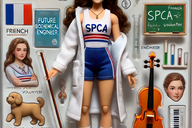You have /5 articles left.
Sign up for a free account or log in.

Getty Images
The college counselor couldn't help but be impressed with the draft application essay. It had a solid theme and related to the student's academic interests. The writing was flawless. But the counselor, who described the situation on condition of anonymity, said that she just didn't think her student could possibly have written it. It was too perfect for a student whose writing wasn't. It was more focused than the student's writing. So she asked the question: Did you get help on this?
The student answered yes -- and the help from a paid essay coach had been substantial. For the counselor, his answer raised ethical and practical issues. On ethics, she asked herself (and colleagues in a series of emails) whether it was proper for her to let the student submit the essay as his own work. As for the practical, she found herself wondering whether the essay was "too good" for someone with the student's grades, and whether it would be obvious that the essay didn't reflect the student's skills.
The counselor said in an interview that the incident focused her attention on a growing part of the admissions process for students of means: writing coaches.
Counselors (those who work for high schools and those hired by families) have long provided various forms of help on application essays. So have parents, English teachers, family friends and others. But increasingly a new industry (completely unregulated) has grown. Students -- many of whom are also paying for private counselors, sometimes at hefty rates -- are also paying thousands in fees for help on their essays. Sometimes, as in the example at the beginning of this article, they don't tell the others who are advising them about the practice.
In interviews, those who provide these services insist that they don't actually write essays. But most also say that they know of competitors who do so. Many said that parents -- not students -- are the ones pushing for a coach to write an essay for a student. And the essay coaches say that they regularly save students from such parents, who are unaware that their essays would immediately be flagged as written by people much older than a typical college applicant. (McSweeney's, the humor website, published a satirical guide to "how to write your teen's college essay" Friday.)
Robert Schwartz, who created Your Best College Essay, is considered among the deans of the field. His website stresses that the work must be from students. His tagline is "Your story. Your voice. Our help."
Formerly a journalist and entertainment writer, Schwartz started his business about six years ago, creating a website to see if anyone would reach out. Five applicants did so. Last year he had 93, including applicants to business, medical and law schools. He charges $1,500 for the basic Common Application essay and then $700 for each 500-word supplemental essay. (Those essays include questions asked by individual colleges and prompts related to why someone wants to go to a particular college, and so most students would have one or two of them for each college, on top of the main Common Application essay.)
The pricing is strictly by the essay, not an hourly rate -- and so his fee covers however many drafts a student wants him to review (after the brainstorming session on what the essay should cover). Two or three drafts are typical.
Schwartz stressed in an interview that he has "never" written an essay for a student, and said that he is "aware of the reputation of people who do what I do." Periodically, he must turn down parents who assume he will do so, and he returns the fee.
"My joy and expertise, I feel, is as the architect," he said. "All day long I talk to smart, ambitious high school seniors. I get into their heads and help find what is unique about them, then show them the insights into their life experiences." He said that he asks questions and makes suggestions, but "their story is the star." He said he views himself as "shrink, tutor, editor and cheerleader." And he said students appear to most appreciate that "I marginalize their parents."
The idea of helping students tell their story is a common theme with coaches, and they say that helps them stay away from actual writing.
"My personal view is that it's a matter of personal ethics and professional ethics, even if it's a service with no regulation whatsoever. It's what you feel right doing," said Christopher Hunt, a former journalist who runs College Essay Mentor. "What feels ethical to me is to help kids identify what they want to say about themselves."
The counselor quoted at the beginning of this article said -- even if essay coaches don't actually write essays -- she worries that the growing industry adds another level of income inequality to the admissions process. After all, those using these services already have wealthy parents and are likely to attend high schools (public or private) with far more resources than the average institution attended by a low-income student.
One essay coach who asked not to be identified said that the equity issue is obvious. He said he takes a few pro bono clients, but that most low-income students could never find someone to do what he does. "How does someone without money" compete "on an equal footing?" he asked.
He said that essay coaching is becoming the norm for wealthy families, just as test prep has over the last few decades and private counselors have in the last decade or so.
Some of the demand for his services, he said, comes from families that have money, but who may feel that they don't have the cultural connections to know what a college admissions officer will want. As a result, much of his clientele comes from the children of immigrants from China, India and Korea -- students whose parents have succeeded economically in the United States, but who themselves didn't go to college (or who didn't go to college in the United States) and worry about missing secrets of U.S. college admissions. This counselor charges a flat rate of $2,500 to help with a student's undergraduate essays.
While admissions officers don't all agree on how important the essay is, this essay coach said that parents increasingly feel that the essay matters more than it did in the past. Everyone hears about how elite colleges have more applicants than they need with perfect grade point averages and near-perfect SATs, he said. So the essay is seen as a differentiator. (Surveys of college admissions officers by the National Association for College Admission Counseling have found that essays do matter but are ranked behind grades in college preparatory courses, strength of high school curriculum, overall high school GPA and standardized test scores in terms of importance.)
This counselor said that he does hear about competitors who go further than he would and actually write essays. He said parents are consistently the culprits.
"My experience is more of parents taking it from kids and just writing it," he said. "I went to work with a kid and I saw an essay and it took me two paragraphs to see that the mom wrote this. I spotted it right away."
He told the mother, "This is not going to serve you well. If I can spot it in a minute, someone else will, too."
One of the newer players in the space is EssayDog, which is based on the film-writing experience of the company's founders, who stress that they teach students how to tell stories. This company sells a range of services, starting with software to walk students through a program to come up with better essay topics ($49), an package that includes two hours of one-on-one consulting ($299) and one with unlimited help ($1,999).
Howard Reichman, president of EssayDog, said his counselors use "almost a Talmudic approach" with students, asking questions and talking through answers. "Students have ideas in their heads and just don't know it." He called what the service does "guided creativity."
He said that there is a "strict firewall" such that his colleagues never actually write, but simply ask questions and offer suggestions. When essay drafts come in (from those paying for more than just the software), "we'll read them and give honest feedback."
The counselor who consulted her colleagues about the essay said she was troubled by the industry. But Reichman said he thinks some college counselors "are threatened" by EssayDog and its competitors.
He said, however, that "what EssayDog does cannot replace what they do. They know the students."
And that lack of connection is why so many counselors worry about the trend. The author who wrote the essay that struck the counselor as off didn't know how out of sync it was with the student's personality and writing. A good counselor would know.
Mark Sklarow, CEO of the Independent Educational Consultants Association, said that his members need to think of the student in full -- and that means that success is only when a student is admitted to a college that will be a good fit. A brilliant essay that gets a student into a college where they may fail isn't a success to a counselor, he said.
"I am concerned about essay tutors," he said. "I think there is a tendency to overstep," in part because of the lack of connection to students. He said he wished the industry didn't exist, but realizes that it has probably gained enough traction that it's here to stay.
Sklarow's members also, of course, help students with essays. But he noted that his members adhere to his association's ethics guidelines as well as NACAC guidelines -- and that members talk about ethics all the time. Personally, he said he would offer this guidance to members on how to avoid problems.
"When you are looking at a student's essay, don't have a pen or pencil in your hand. Your job is not to change words or grammar. It's to talk to student about whether from a content standpoint, is it revealing something? Are you letting an admissions director know who you are?" he said. "When you have that pen in hand, you are probably making too many edits."
On one area, however, Sklarow agreed with the essay coaches -- there is a great danger of all the problems with essay coaches taking place with parents and family friends.
"I think there is concern about essays all around, and not only paid help," he said. "I'm concerned when Aunt Gladys, an English teacher, wants it to be rewritten."




